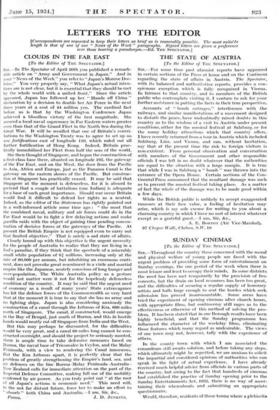LETTERS TO THE EDITOR
[Correspondents are requested to keep their letters as brief as is reasonably possible. The most suita5le length is that of one of our " News of the Week " paragraphs. Signed letters are given a preference over those bearing a pseudonym.—Ed. THE SPECTATOR.]
CLOUDS IN THE FAR EAST
[To the Editor of THE SPECTATOR.] SIR,--IR The Spectator of April 20th you published a remark- able article on " Army and Government in Japan." And in your "News of the Week" you refer to "Japan's Monroe Doc- trine." You very properly say, " What Japan's actual inten- tions are is not clear, but it is essential that they should be met by the whole world with a united front." Since the article appeared, Japan has followed up her " Hands off China " declaration by a decision to double her Air Force in the next three years at a cost of 44 million yen. The cardinal fact before us is that by the Washington Conference Japan achieved a bloodless victory of the first magnitude. She secured a local naval supremacy in Far Eastern waters greater even than that of the Grand Fleet in the North Sea during the Great War. It will be recalled that one of Britain's contri- butions to the Washington Treaty was to agree to set up no sea' fortifications east of longitude 110, which ruled out all further fortification of Hong Kong. Indeed, Britain prac- tically immobilized her Fleet from half the seas of the world.
She then thought of Singapore, and began the construction of a first-class base there, situated on longitude 105, the gateway of the Far East, and on the West, the door from the Pacific to Asia, Africa and Europe, just as the Panama Canal is the gateway on the eastern shores of the Pacific. But construc- tion at Singapore has practically ceased. It may be said that Singapore at the moment is defenceless, for it is absurd to pretend that a couple of battalions (one Indian) is adequate for a base of such great importance. Should war occur Britain would find it difficult to defend her rights as a neutral. Indeed, as the editor of the Statesman has rightly pointed out in a well-informed article some time ago : " the most that the combined naval, military and air forces could do in the Far East would be to fight a few delaying actions and make guerilla raids with the object of gaining time pending concen- tration of decisive forces at the gateways of the Pacific. At present the British Empire is not equipped even to carry out that limited objective." That is surely a sad state of affairs.
Closely bound up with this objective is the urgent necessity- for the people of Australia to realize that they are living in a fool's paradise, if they think that the spectacle of a miserably small white population of 61 millions, increasing only at the rate of 80,000 per annum, but inhabiting an enormous conti- nent, does not provoke great resentment in a virile and martial empire like the Japanese, acutely conscious of long hunger and over-population. The White Australia policy as a gesture would not matter were it not for the hopelessly defenceless condition of the country. It may be said that the urgent need of economy as a result of many years' State extravagance has hit the defence forces of the Commonwealth so very hard that at the moment it is true to say that she has no army and no fighting ships. Japan is also considering anxiously the construction of a canal through the Isthmus of Kra, 600 miles north of Singapore. The canal, if constructed, would emerge in the Bay of Bengal, just south of Burma, and this in hostile hands would neatly cut off Singapore from India and the West.
But this may perhaps be discounted, for the difficulties would be very great, and a canal 60 miles long cannot be con- structed overnight, and should the project be seriously mooted, there is ample time to take defensive measures based on Burma, the naval base of Tricomalee in Ceylon, and the Malay Peninsula, with a view to rendering the Canal innocuous. But the Kra Isthmus apart, it is perfectly clear that the problem of greatly strengthening the Empire's land, sea, and air defences on the line Burma-Malay Peninsula-Australia- New Zealand calls for immediate attention on the part of the Imperial Defence Committee, making full use of the mobility conferred by air power. As you truly point out " at the root of all Japan's actions is economic need." This need will, in the not far distant future, force her to make an effort to " absorb " both China and Australia.—I am, Sir, &c.,
















































 Previous page
Previous page